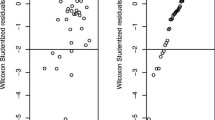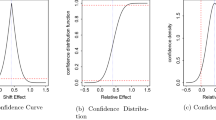Abstract
n rankable persons appear sequentially in random order. At theith stage we observe the relative ranks of the firsti persons to appear, and must either select theith person, in which case the process stops, or pass on to the next stage. For that stopping rule which minimizes the expectation of the absolute rank of the person selected, it is shown that asn → ∞ this tends to the value
.
Access this article
We’re sorry, something doesn't seem to be working properly.
Please try refreshing the page. If that doesn't work, please contact support so we can address the problem.
Similar content being viewed by others
Reference
D. V. Lindley,Dynamic programming and decision theory, Applied Statistics10 (1961), 39–51.
Author information
Authors and Affiliations
Additional information
Research supported by Office of Naval Research and Aerospace Research Laboratories. Reproduction in whole or in part is permitted for any purpose of the United States Government.
Rights and permissions
About this article
Cite this article
Chow, Y.S., Moriguti, S., Robbins, H. et al. Optimal selection based on relative rank (the “secretary problem”). Israel J. Math. 2, 81–90 (1964). https://doi.org/10.1007/BF02759948
Received:
Issue Date:
DOI: https://doi.org/10.1007/BF02759948




